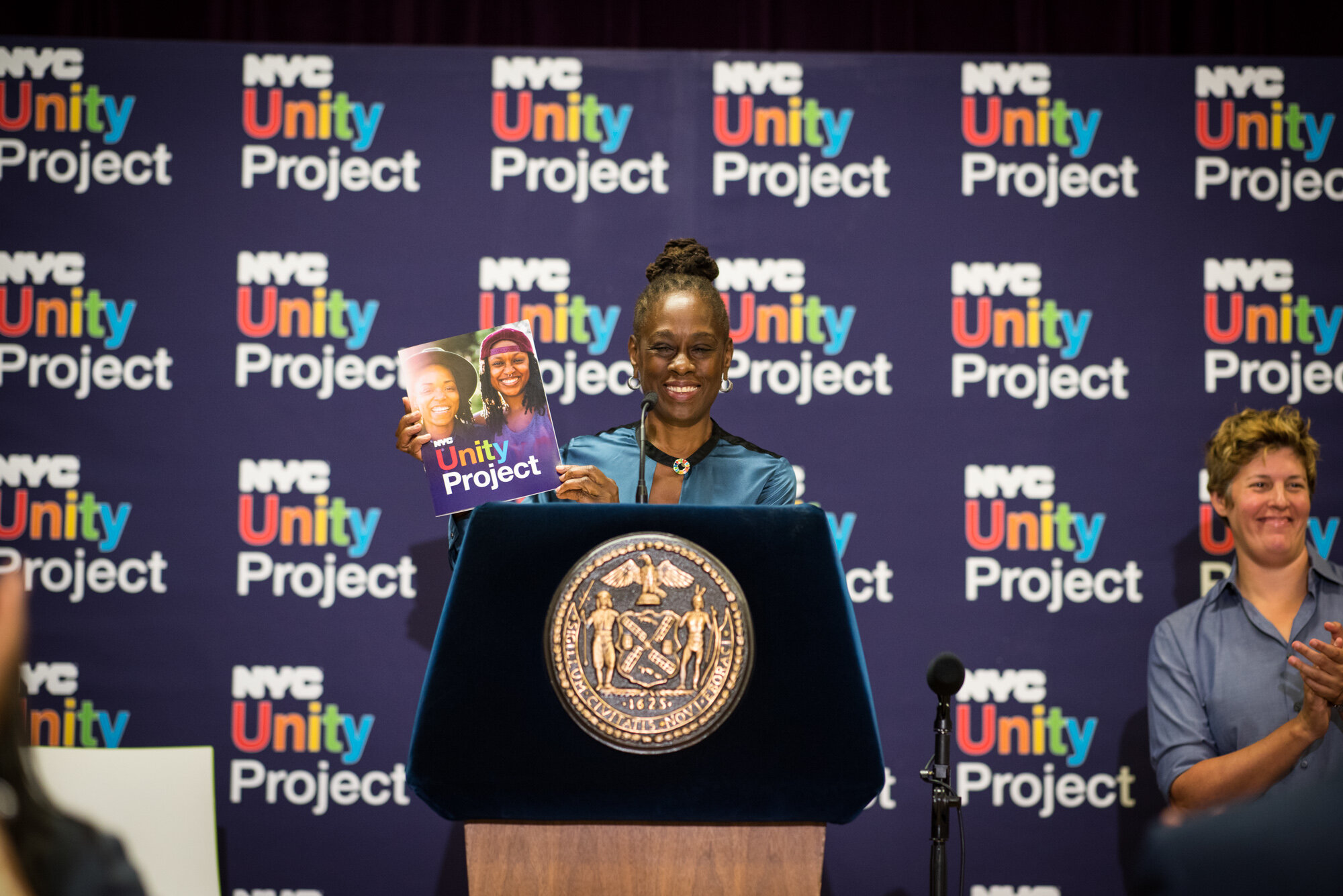NYC halts celebrated work program for homeless LGBTQ youth
/The city will cut an employment initiative for homeless LGBTQ young people set to begin July 1. The umbrella program, NYC Unity, was the subject of a municipal ad campaign on subways and buses. Photo via NYC Unity
By David Brand
As attorneys argued a workplace rights case before the U.S. Supreme Court last October, advocates and members of the de Blasio Administration gathered at City Hall to unveil a first-of-its-kind employment program for homeless LGBTQ young people in New York City.
But seven months later, the initiative, known as NYC Unity Works, is on the chopping block — a budget casualty that will save the city $2.7 million over the next four years
Unity Works was set to begin July 1 as the next phase of the lauded NYC Unity Project, which supports LGBTQ young people far more likely to experience homelesness, face violence or commit suicide than their peers. Unity Works would connect participants to jobs with meaningful opportunities for growth — not just dead-end, minimum wage roles.
“We’re proud to launch the nation’s most comprehensive workforce program for LGBTQI young people to make sure they have the education, training and the experience they need to start successful careers,” said First Lady Chirlane McCray at the time. “We will not sit on our hands while the forces in Washington, DC, and throughout this country push back on human rights and push back on our truth.”
Now, however, the program is on indefinite “pause” as the city looks to cut spending and adjust to the coronavirus, the mayor’s office said.
“Unfortunately, we will only be able to revisit the NYC Unity works contract when this deadly pandemic winds down,” said City Hall spokesperson Laura Feyer. The de Blasio administration is still committed to supporting LGBTQ young people, Feyer added.
The Department of Community and Youth Development, which administers the Unity Works program, had already selected a contract recipient, but the agency never announced which organization would get the money to run the program, advocates said.
First Lady Chirlane McCray unveiled The Unity Project in 2017. She and the de Blasio administration introduced NYC Unity Works in October 2019, garnering praise from advocates nationwide. Photo by Edwin J. Torres/Mayoral Photography
In a letter Tuesday, dozens of local groups urged Mayor Bill de Blasio, DYCD Commissioner Bill Chong and Unity Project Director Ashe McGovern to award the contract and not cut a program that would facilitate jobs for some of the most vulnerable New Yorkers.
“At a time when marginalized communities are already being disproportionately impacted financially by the COVID-19 crisis, we find it completely unacceptable that the City is not ensuring that a program that was intentionally developed to address income inequality faced by LGBTQ youth is not being awarded as planned,” reads the letter drafted by Coalition for Homeless Youth Executive Director Jamie Powlovich.
The letter refers to Runaway and Homeless Youth, or RHY — a term the city and nonprofits use to refer to homeless people aged 16 to 24.
“RHY youth, particularly LGBTQI youth, are disproportionately experiencing the impact of COVID-19 already and by suspending or delaying the start of this vital program, the City will be making the decision to negatively impact this population further,” the letter continues.
The suspension came as a surprise to advocates because the city has celebrated the NYC Unity Project, even featuring the initiative in an ad campaign on subways and buses.
As a part of the NYC Unity Project, “We Are LGBTQ Youth” campaign hits subways, buses, and social media: https://t.co/kbCApQAaPp @NYCFirstLady pic.twitter.com/hEsSNPAjMh
— City of New York (@nycgov) May 14, 2018
Powlovich told the Eagle she understands the city’s budget woes — a $6 billion deficit exacerbated by the coronavirus — but said that Unity Works is a relatively modest expense with valuable outcomes.
Coupled with the potential loss of the Summer Youth Employment Program, homeless LGBTQ New Yorkers between ages 16 and 24 will have few opportunities for job training and placement, she said.
“The city is taking away all intentional investments in the economic stability of homeless young adults,” Powlovich said.
Alex Roque, the executive director of social service organization Ali Forney Center, said the program could mitigate the financial impact of the coronavirus crisis for many homeless LGBTQ youth.
“The coronavirus will further wedge the disparities that young people experience, including the lack of access to employment,” said Roque, whose organization signed the letter to the city. “I trust the city takes into account that this is a population that is on the outskirts of the outskirts and the most marginalized of all.”





